Understanding the Shift Towards Interdisciplinary Elder Mental Health Care
As the global population ages, the complexity of mental health issues among older adults calls for innovative, integrated approaches. Interdisciplinary care models, which foster collaboration among healthcare, social services, and community resources, are proving essential in addressing the multifaceted needs of the elderly. This article explores the components, strategies, outcomes, and best practices of these approaches, emphasizing their application across clinical and community settings to improve mental health outcomes for older populations.
Fundamentals of Interdisciplinary Approaches in Elder Care
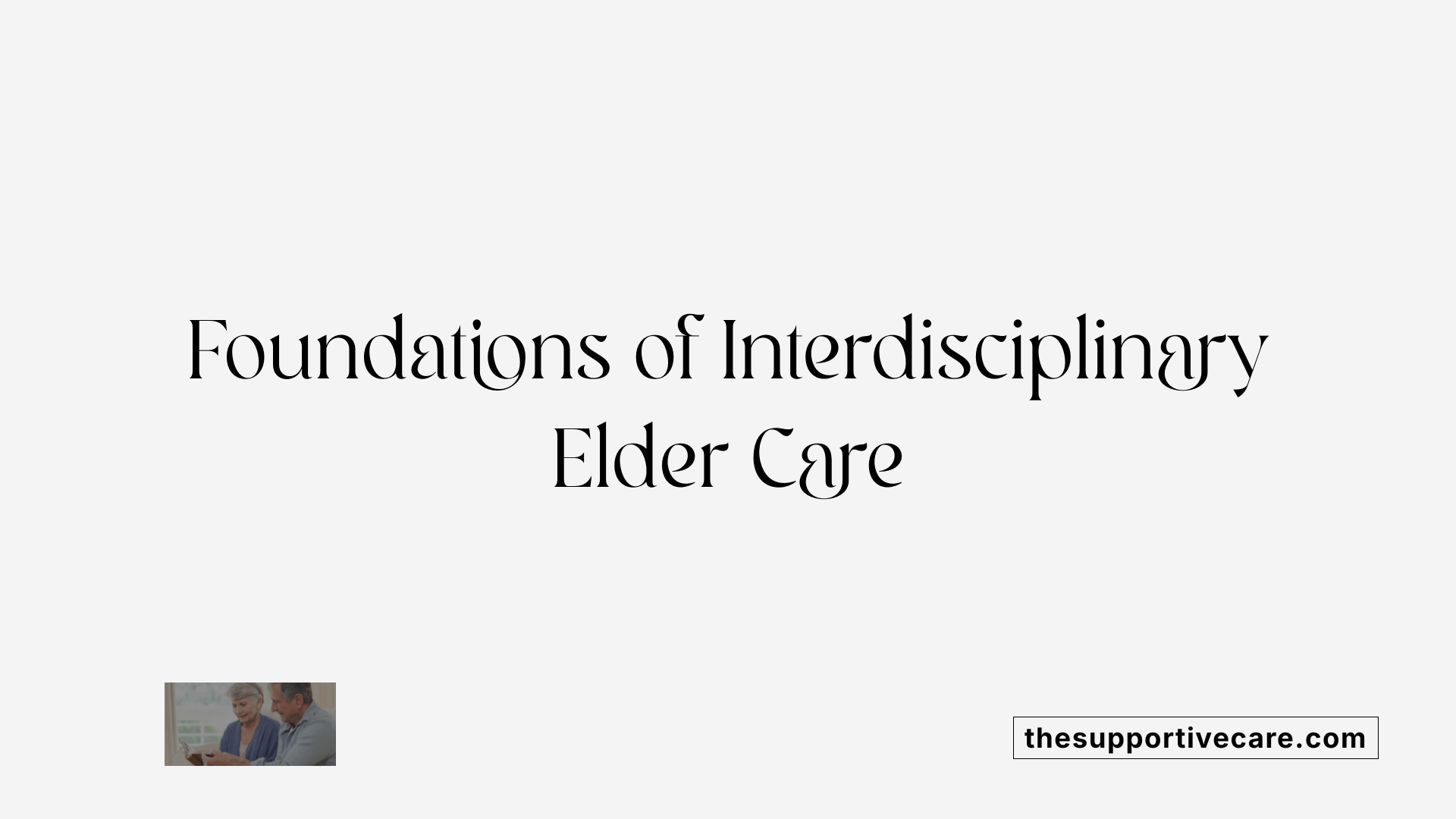
What are interdisciplinary approaches to mental health in elder care?
Interdisciplinary approaches in elder care involve a collaborative effort among various healthcare and social service professionals. This team typically includes primary care physicians, mental health specialists such as psychiatrists and psychologists, social workers, nurses, and occupational therapists.
These models aim to address the complex biological, psychological, and social needs of older adults by providing integrated, person-centered care. Comprehensive assessments are conducted to understand each individual’s unique health status, and tailored treatment plans are developed to meet their specific needs.
Proactive management strategies are emphasized, considering multimorbidity—multiple concurrent health issues—and the personal preferences of the elders. Many programs incorporate technology, such as electronic medical records and telehealth services, to improve communication, coordination, and ongoing follow-up.
Studies have shown that such integrated care models lead to better clinical outcomes, including reductions in depressive symptoms and higher response rates to treatment. Moreover, they improve organizational efficiency by streamlining resource use and ensuring continuity of care.
Overall, these approaches facilitate accessible, effective, and holistic mental health support for the aging population across various settings, including primary care clinics, community centers, and long-term care facilities.
Core Components and Strategies in Interdisciplinary Elder Mental Health Models
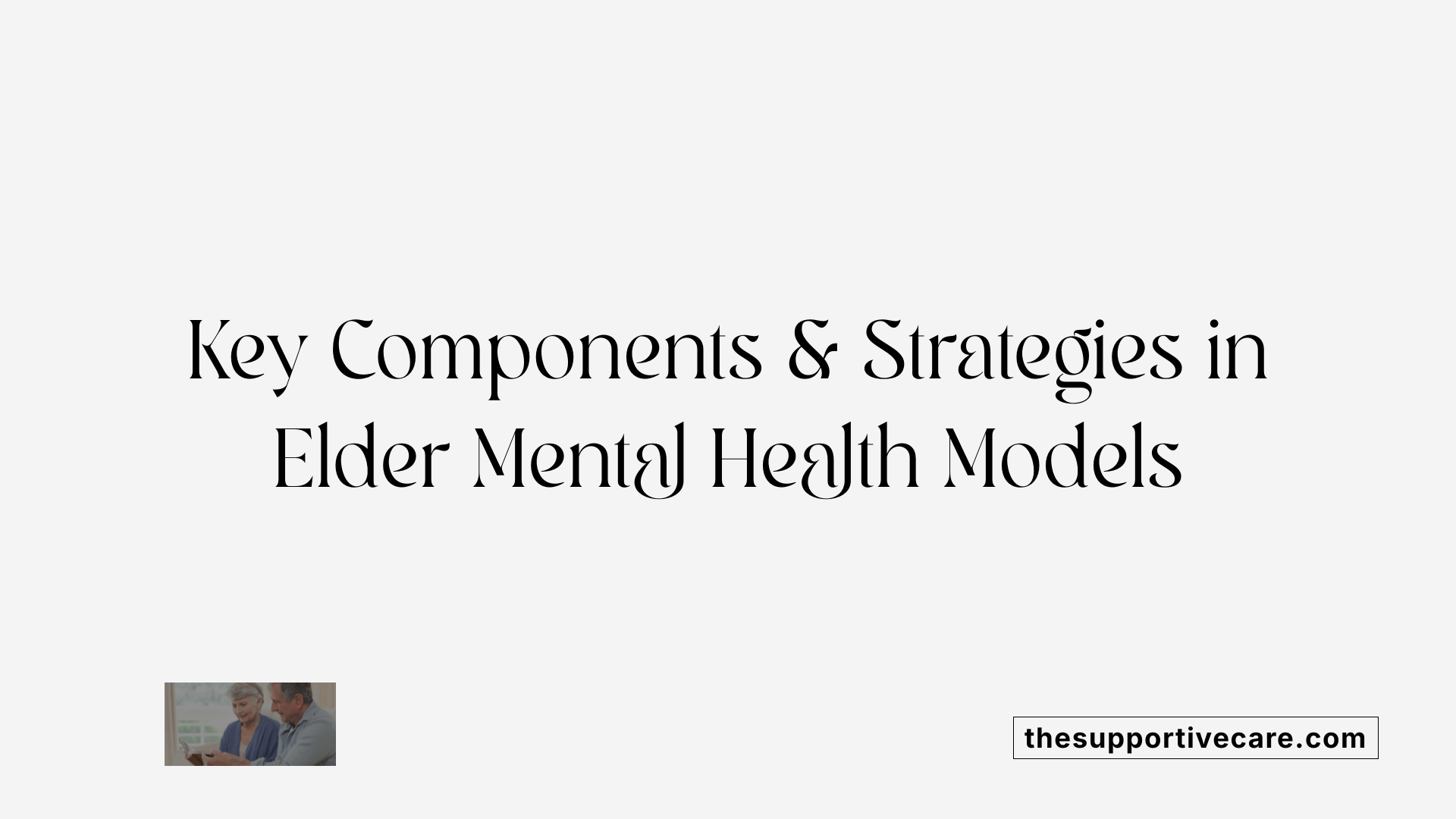
What are the components and strategies used in interdisciplinary mental health care models for older adults?
Interdisciplinary mental health care models for older populations employ a range of integrated components designed to address the complex needs of elderly patients. Central to these models are comprehensive assessments that evaluate cognitive, emotional, social, and physical aspects. Tools such as the Mini-Mental State Examination (MMSE) and the Geriatric Depression Scale (GDS) are frequently used to inform holistic evaluations.
Care planning is person-centered, emphasizing tailored interventions based on individual preferences, abilities, and cultural backgrounds. These plans are developed collaboratively by multidisciplinary teams including primary care physicians, mental health specialists, nurses, social workers, and often caregivers. Regular team meetings and shared electronic health records facilitate communication and coordination, ensuring that interventions like cognitive-behavioral therapy (CBT), medication management, social activities, and community resources are effectively integrated.
Strategies emphasize proactive, integrated approaches that consider physical health, psychological well-being, and social engagement. Frameworks such as the 4Ms (What Matters, Medication, Mentation, Mobility) guide care delivery, ensuring holistic attention to each essential domain.
Effective teams operate on clear communication, role clarity, and shared decision-making. They often leverage telehealth and community-based services to improve access, especially for those in remote or underserved areas. The inclusion of caregivers and family members is vital for education, support, and adherence to treatment plans.
Finally, attention to social determinants—such as socioeconomic status, housing stability, and social support networks—helps tailor interventions that address broader factors influencing mental health. Policy support and staff training in cultural competence, trauma-informed care, and mental health literacy further enhance the quality and effectiveness of these interdisciplinary efforts.
Role and Impact of Multidisciplinary Teams in Elder Mental Health Management
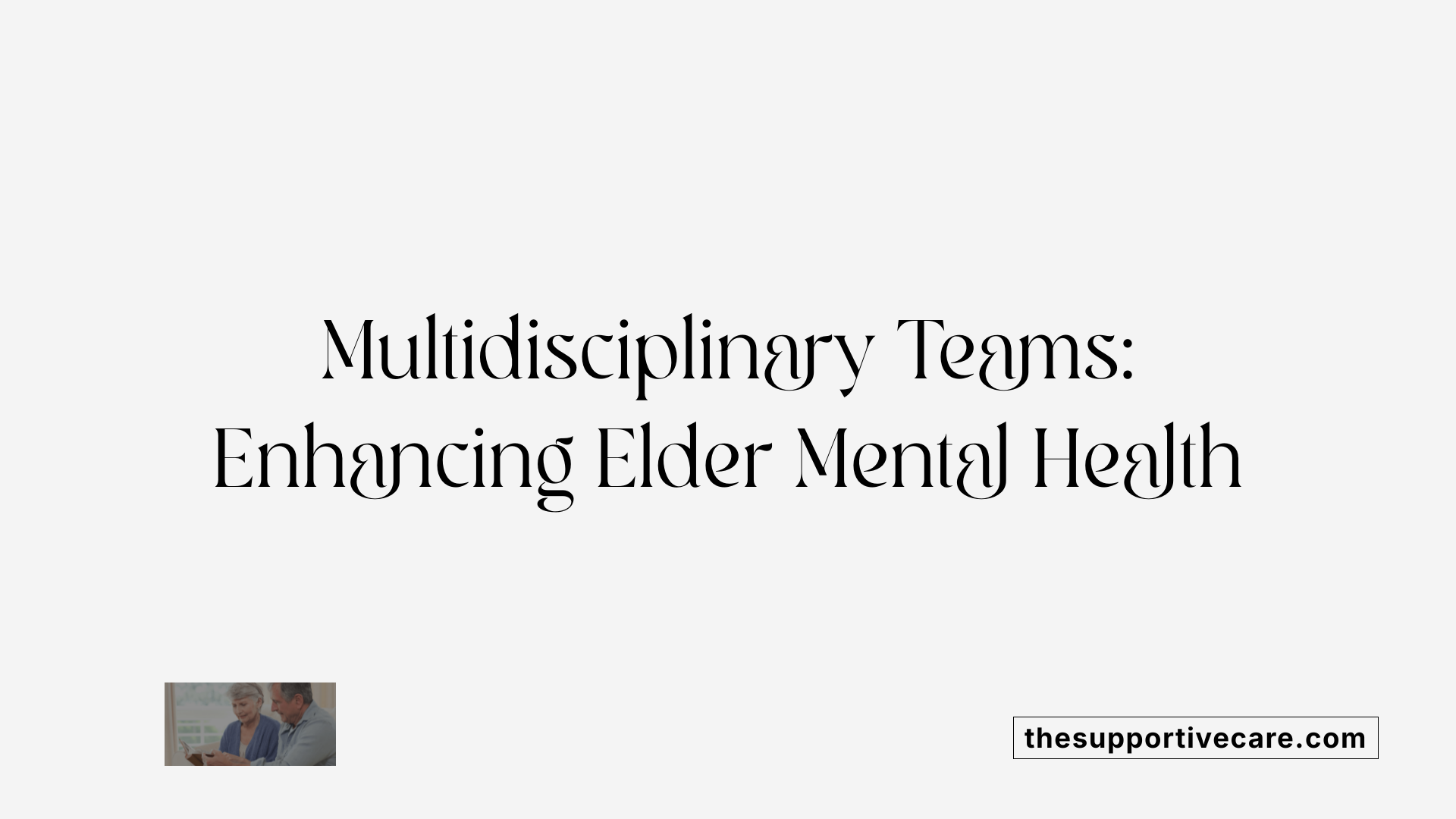
What is the role of multidisciplinary teams and collaboration in managing mental health in older adults?
Multidisciplinary teams (MDTs) are fundamental in providing comprehensive mental health care for older people. These teams bring together a variety of professionals, including primary care physicians, psychiatrists, psychologists, nurses, social workers, and other specialists. Their collective expertise allows for thorough assessment, diagnosis, and personalized treatment planning tailored to each individual's needs.
Effective collaboration within MDTs ensures a continuous and cohesive approach to care. This coordination reduces service fragmentation, allowing seamless transitions across different healthcare settings and ongoing support. Clear communication among team members fosters synergy, making sure that all aspects of an older adult's mental and physical health are addressed.
Involving patients actively in the decision-making process is viewed as essential. Shared decision-making empowers elders, respects their preferences, and improves adherence to treatment plans. Family members and caregivers are also integral, providing valuable insights and support.
Studies highlight that such teamwork not only enhances treatment effectiveness but also increases patient satisfaction. It promotes social support systems, which are crucial for mental health and overall well-being.
In summary, multidisciplinary collaboration creates a holistic, person-centered care environment. It efficiently manages the complex mental health needs of older adults while fostering dignity, independence, and quality of life through integrated efforts.
Assessment, Competencies, and Strategies for Effective Team-Based Elder Mental Health Care
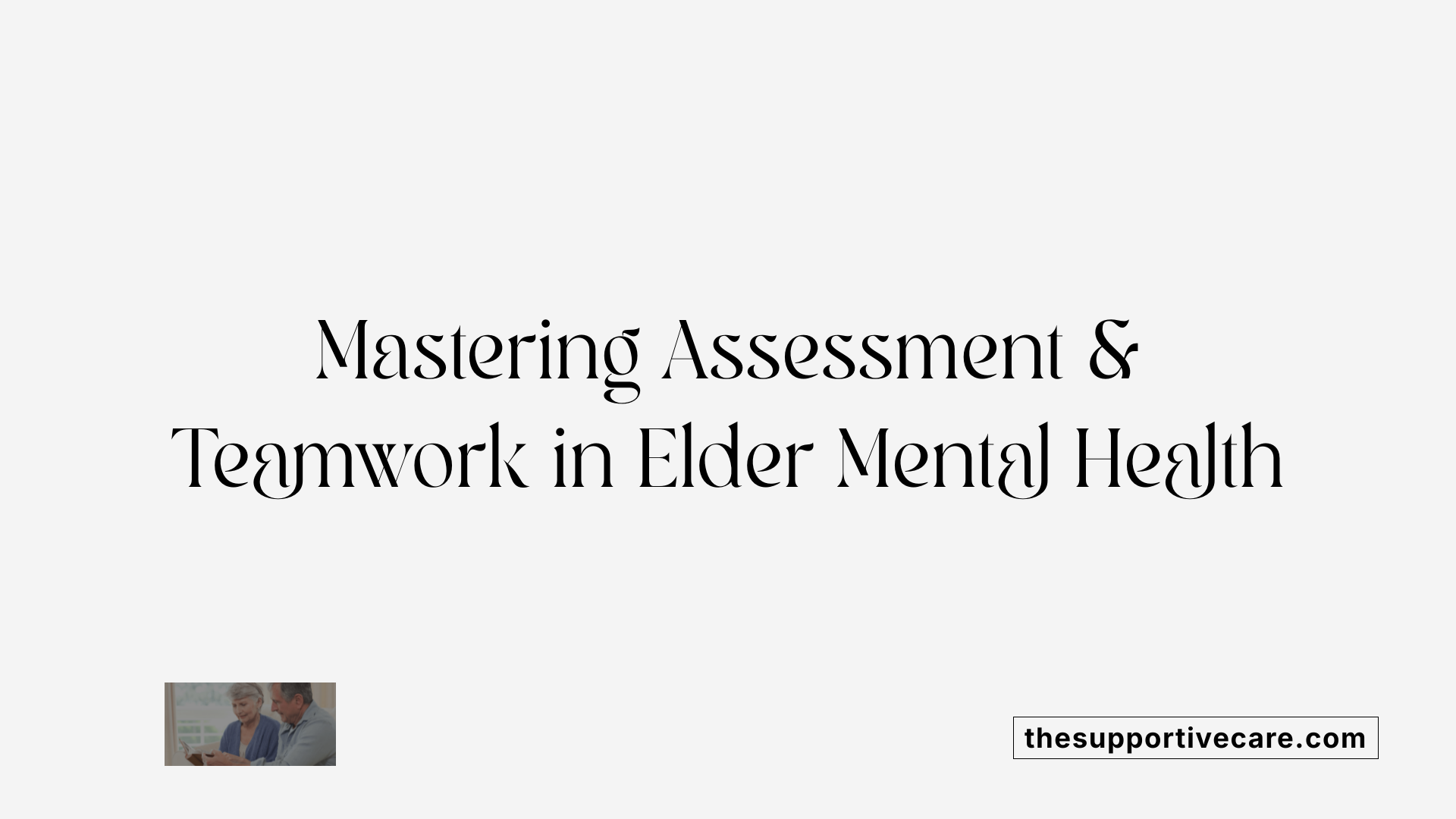
How are assessments, collaborative strategies, and competencies utilized in multidisciplinary teams for elder mental health care?
Effective mental health care for older adults depends heavily on thorough assessment and skilled teamwork. These teams often perform comprehensive biopsychosocial evaluations, which include gathering medical history, cognitive testing, and emotional assessments tailored to individual needs. Standard tools like the Mini-Mental State Examination (MMSE) and Geriatric Depression Scale (GDS) facilitate early detection and ongoing monitoring of mental health issues.
Collaboration strategies are central to achieving good outcomes. Regular team meetings, shared decision-making, and coordinated interventions are common practices. These efforts are supported by core team competencies such as effective communication, cultural sensitivity, leadership skills, and the ability to work across disciplines. Psychiatrists, nurses, social workers, and primary care providers play specific roles in implementing these strategies.
A well-known model exemplifying this approach is the Collaborative Care Model (CoCM). It integrates care managers, psychiatrist consultations, and measurement-based care, enhancing diagnosis, treatment, and follow-up. Measurement tools help track progress and adjust treatment plans swiftly.
Leadership within teams is often strengthened by self-assessment tools like the SLATE (Self-Learning Assessment Tool for Teams), which encourages reflection on team performance. Continuous evaluation and adaptation are vital—ensuring that multidisciplinary teams deliver holistic, patient-centered care.
Overall, combining detailed assessments, strong collaborative practices, and professional competencies results in improved mental health outcomes, better physical functioning, and an enhanced quality of life for older adults with mental health concerns.
Outcomes, Evidence, and Application of Interdisciplinary Elder Mental Health Strategies
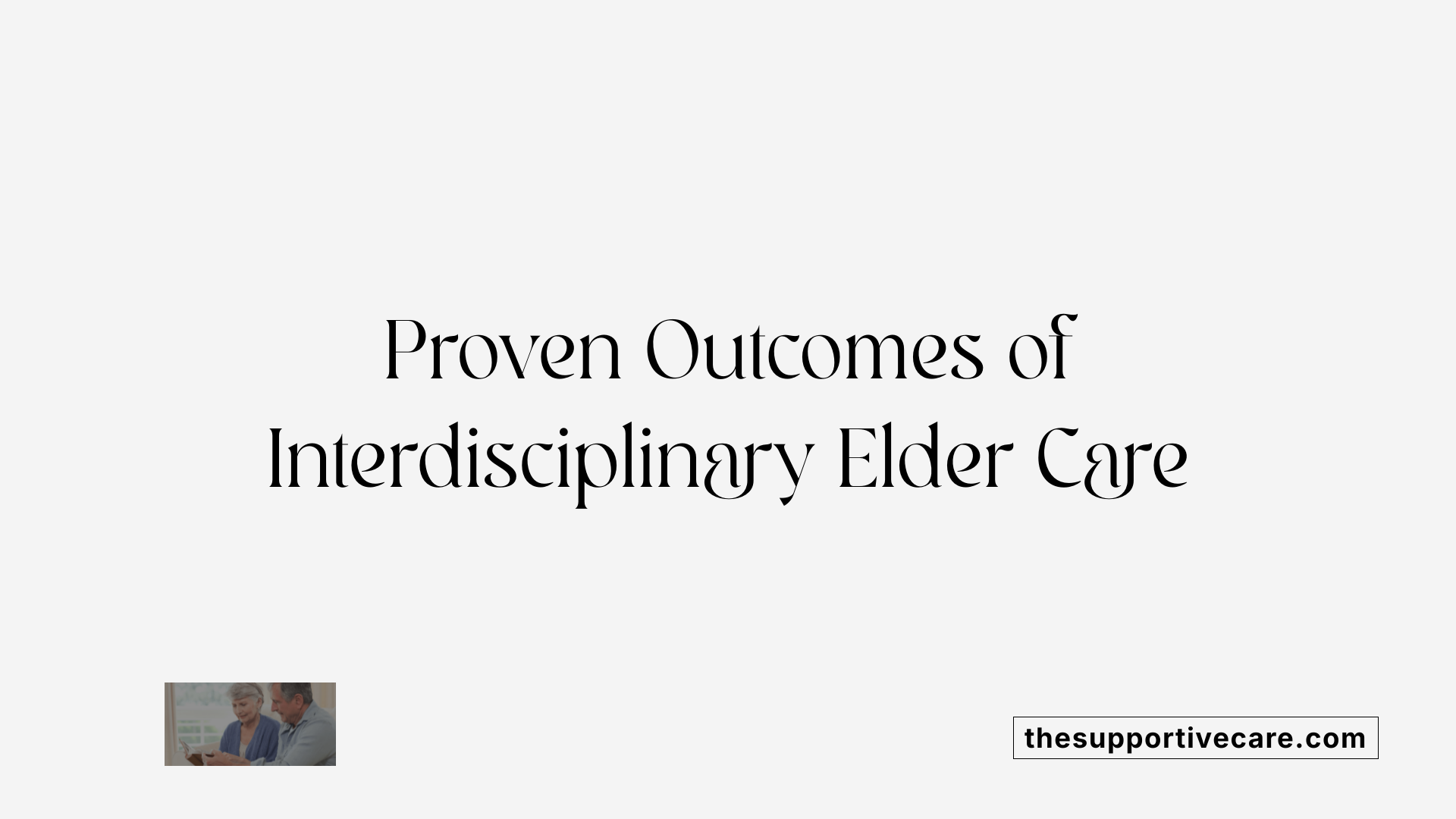
What are the outcomes and benefits of integrating multiple disciplines in elder mental health services?
Bringing together different healthcare, psychological, and social professionals creates a powerful approach to elder mental health care. This teamwork enhances the accuracy of diagnoses, ensuring that underlying issues like depression, anxiety, or cognitive decline are fully understood. Treatment plans become more effective when tailored to the individual, considering physical health, mental state, and social environment.
One major advantage is improved coordination of care. Multidisciplinary teams communicate regularly, reducing errors, avoiding duplication, and ensuring that care is seamless. This collaboration often leads to early identification of mental health problems, allowing for timely interventions.
Engaged seniors benefit from shared decision-making, boosting their confidence and independence. Interdisciplinary models also support prevention strategies, lessening the need for emergency hospitalizations and reducing overall healthcare costs.
Research, including systematic reviews on integrated elder mental health programs, consistently shows that these approaches produce better health outcomes. Patients report improvements in symptoms, functional status, and quality of life.
Community programs mirror clinical practices, emphasizing holistic care that combines medical, psychosocial, and environmental strategies. Such integration ensures that older adults receive personalized services that match their complex needs, ultimately fostering a healthier, more engaged aging population.
Advancing Elder Mental Health Care: A Call for Integrated, Collaborative Models
The evidence underscores that interdisciplinary approaches are vital in delivering comprehensive, effective, and accessible mental health services to older adults. By fostering collaboration across disciplines, utilizing evidence-based strategies, and leveraging innovative technologies, healthcare systems can significantly improve the mental well-being, independence, and quality of life for the aging population. Moving forward, continuous research, policy support, and community engagement are essential to refine these models, promote best practices, and ensure that the mental health needs of older adults are met broadly and effectively in diverse settings.
References
- An Interdisciplinary Approach to Improving Care for Older Adults
- Integrated Care Models for Older Adults with Depression and ...
- An Interdisciplinary Team Approach to Geriatric Patient Care
- Providing Mental Health Services within Community Geriatric ...
- Interdisciplinary Teams in Geriatric Care - Number Analytics
- [PDF] Supporting the Mental Health Needs of Older Adults | SAMHSA
- Effectiveness of an interdisciplinary home care approach for older ...


































































































